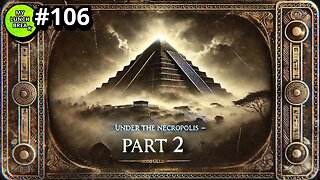Premium Only Content

Isaiah 13 - About 175 years after Isaiah's prophecy, Babylon was destroyed. 7.5.24 Sabbath study
Isa 13:19 And Babylon, the beauty of kingdoms, the glory of the Chaldeans' pride, Will be as when God overthrew Sodom and Gomorrah.
This prophecy has both a near and far fulfillment. About 175 years after this prophecy from Isaiah, Babylon was plundered and destroyed. But Babylon continued as somewhat of an important city for a long time afterward. Succeeding Persian kings eventually destroyed the city.
By the year 20 BC, Strabo described Babylon as a "vast desolation." This is a remarkable prophecy because at the time this was written, the nation of Babylon was struggling for existence. It was not a great power at all. Assyria was the dominant power in that day and controlled most of the nations in that area. The text says that Isaiah "saw" this oracle concerning Babylon. Whether he saw the words in a vision or saw a vision of the happening is not clear.
This chapter begins a different section of Isaiah. Chapters 13-23 consist of a series of burdens or woes against nine nations surrounding Judah. These were all nations that persecuted Israel at one time and Elohim is going to punish them.
The prophet speaks against Babylon, Assyria, Philistia, Moab, Damascus, Ethiopia, Egypt, Elam, Media, Arabia, Tyre, and concludes with a description of the final judgment. These nations are all peoples that eventually became Arab or at least Muslim. Most of the prophecies in this section have already been fulfilled. They are now facts of history. This section is similar to Ezekiel 25-32 and Jeremiah 46-51.
Isa 13:1 The oracle concerning Babylon which Isaiah the son of Amoz saw.
This is a remarkable prophecy because at the time this was written, the nation of Babylon was struggling for existence. It was not a great power at all. Assyria was the dominant power in that day and controlled most of the nations in that area.
The text says that Isaiah "saw" this oracle concerning Babylon. Whether he saw the words in a vision or saw a vision of the happening is not clear. This section of prophecy is so remarkable that many liberal theologians do not attribute it to Isaiah. They rather credit it to other men who lived at a later time, witnessed theses things when they happened, and inserted them into the book of Isaiah some hundreds of years later. There is no evidence that this is the case. The writing style is still Isaiah. The very first verse in this section identifies the author very clearly. The Dead Sea Scrolls contained a complete copy of Isaiah. The book of Isaiah in the day of Yeshua was the exact same one that we are reading today and there is no reason to think it was completed in the day of Isaiah.
River Valley Torah Assembly
http://rvtorah.com/
-
 25:08
25:08
MYLUNCHBREAK CHANNEL PAGE
1 day agoUnder The Necropolis - Pt 2
254K60 -
 1:45:59
1:45:59
Spittin' Chiclets
1 day agoCanadian Chokejob - Game Notes Live From Chicago - 12.28.2024
242K31 -
 9:18
9:18
Space Ice
21 hours agoThe Guyver - Alien Bug Suits, Exploding Dragons, & Mark Hamill - Weirdest Movie Ever
151K25 -
 12:46
12:46
RealReaper
2 days ago $8.26 earnedMufasa is a Soulless Cash Grab
88.5K1 -
 5:14:24
5:14:24
FusedAegisTV
22 hours agoWelcome to The King of Iron Fist Tournament! \\ TEKKEN 8 Stream #1
153K3 -
 DVR
DVR
Bannons War Room
1 year agoWarRoom Live
101M -
 5:42:36
5:42:36
FreshandFit
1 day agoLive X Censorship For Opposing Immigration?!
131K123 -
 1:08:16
1:08:16
Tactical Advisor
23 hours agoNEW Budget Glocks | Vault Room Live Stream 011
140K10 -
 16:30
16:30
SNEAKO
1 day agoNO FRIENDS IN THE INDUSTRY.
173K72 -
 6:19
6:19
BlackDiamondGunsandGear
1 day agoHow Fat Guys can Appendix Carry
121K16